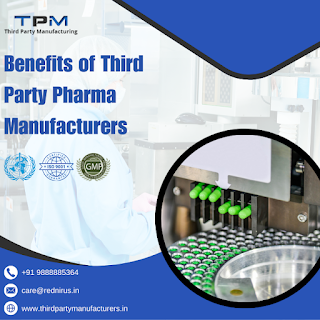Benefits of Third Party Pharma Manufacturers
In a dynamic
pharmaceutical environment, companies are constantly looking for new ways to
optimize their operations while maintaining high standards of pharmacy and
effectiveness One strategy that has grown tremendously in recent years is they
will partner with a third party manufacturing. These specialized organizations
are known as third party pharmaceutical manufacturers, and offer a range of
services such as third party manufacturing. Let’s explore the myriad benefits
of these partners especially in this collaboration.
Understanding Third Party Manufacturing in the Pharma Industry
In the pharmaceutical landscape, innovation performs an essential role in streamlining manufacturing methods and assembly market needs. Pharmaceutical Contract Manufacturing, additionally called pharma businesses.
These
companies, also known as pharmaceutical companies provide specialized
expertise, processes, and compliance to manufacture drugs under consumer brand
names This arrangement allows pharmaceutical companies to use third parties for
a focus on research, marketing and distribution
Benefits of Pharmaceutical Third Party Manufacturing
1. Cost efficiency: Third party pharma manufacturing, rather than setting up and maintaining offices in-house, results in significant cost savings by outsourcing to a specific pharmaceutical company
2. Expertise
and Specialization: The technical savvy and cutting-edge technologies of the
pharmaceutical third-party manufacturing companies enable them to deliver high
quality third party manufacturing products.
3. Focus on
Core Activities: Pharma must prioritize
its core competencies together with research, improvement and commercialization
of pharmaceutical groups via agreements with third-party pharmaceutical
corporations.
4.
Flexibility and Scalability: Third party manufacturing
provides flexibility in changing production volumes to meet market demands.
Companies can increase or decrease production without investing in additional
capacity.
5. Risk
Mitigation: Pharmaceutical risks reduce the burden on pharmaceutical
manufacturers. It also controls the risks of non-compliance and obsolete
technology.
6. Speed to Market:
Partnering with a third party manufacturing company in the Pharma industry
decreases lead time, shortens time to market and promotes faster production of
new medicine.
7.
Regulatory Compliance: Credible third party manufacturers complying with
stringent regulations follow the international quality and safety regulations.
8. Access to
Innovation: The collaboration with third party manufactures ensure us a low
cost exposure to the state-of-the-art technologies and innovative manufacturing
processes without huge initial investments.
Criteria for Choosing the Right Third Party Manufacturer
Choosing the
right third party is critical for pharmaceutical companies. Key inspections
include assessing the manufacturer’s experience and reputation in third-party
pharmaceuticals, ensuring compliance with regulatory standards, assessing
manufacturing capacity and capabilities, testing quality assurance products,
and assess costs plus equity in terms of connectivity, transparency and
flexibility. Pharmaceutical companies need to do very due diligence, seek
recommendations, coordinate closely with potential manufacturers to ensure that
they meet their goals and values Finally, a qualified third-party
pharmaceutical company selection can have a significant impact on the success
and reputation of pharmaceutical products.
Regulatory Considerations in Pharma Third Party Manufacturing
Legal
considerations are critical to the development of 3rd Party Pharma Manufacturing
Companies. Contract manufacturers must adhere to strict rules set by
the pharma regulator. Adherence to GMP ensures the quality, safety and efficacy
of third-party chemicals. Third party manufacturers must also meet the specific
regulatory requirements of the communities in which their products will be
distributed. Regular audits and inspections verify compliance with these
standards. Partnering with contracting companies that prioritize compliance
mitigates risks and builds stakeholder confidence. Regulatory considerations
are central to every phase of the pharmaceutical development of third-party
drugs, ensuring product quality and the highest levels of patient safety
Quality Assurance and Control in Third Party Manufacturing
To guarantee
the quality and safety of pharmaceutical goods at all times, third party manufacturing
must prioritize quality and process control. Strong quality assurance measures
include high quality supplier qualification, strict management of control
systems and GMP compliance. Quality control includes careful testing and
analysis of various products to immediately identify and address any deviations
or deficiencies. Regular audits, inspections, and documentation support quality
standards and regulatory compliance. Effective communication and collaboration
between pharmaceutical companies and innovators facilitates continuous
improvement and supports the highest quality standards, ultimately resulting in
customer satisfaction and confidence in the medical profession.
Conclusion
In
conclusion, Third Party Pharma Manufacturers in the pharmaceutical industry
offers numerous advantages, including cost efficiency, expertise, flexibility,
and speed to market. However, successful collaboration hinges on selecting the
right manufacturer and navigating regulatory considerations while prioritizing
quality assurance and control. By adhering to stringent quality standards,
maintaining clear communication, and fostering collaboration, pharmaceutical
companies can leverage the expertise and resources of third party pharma manufacturers
to streamline production processes and deliver safe, high-quality medicines to
market efficiently. Embracing these principles ensures the continued success
and integrity of third party manufacturing partnerships, driving innovation and
advancement within the pharmaceutical sector.
